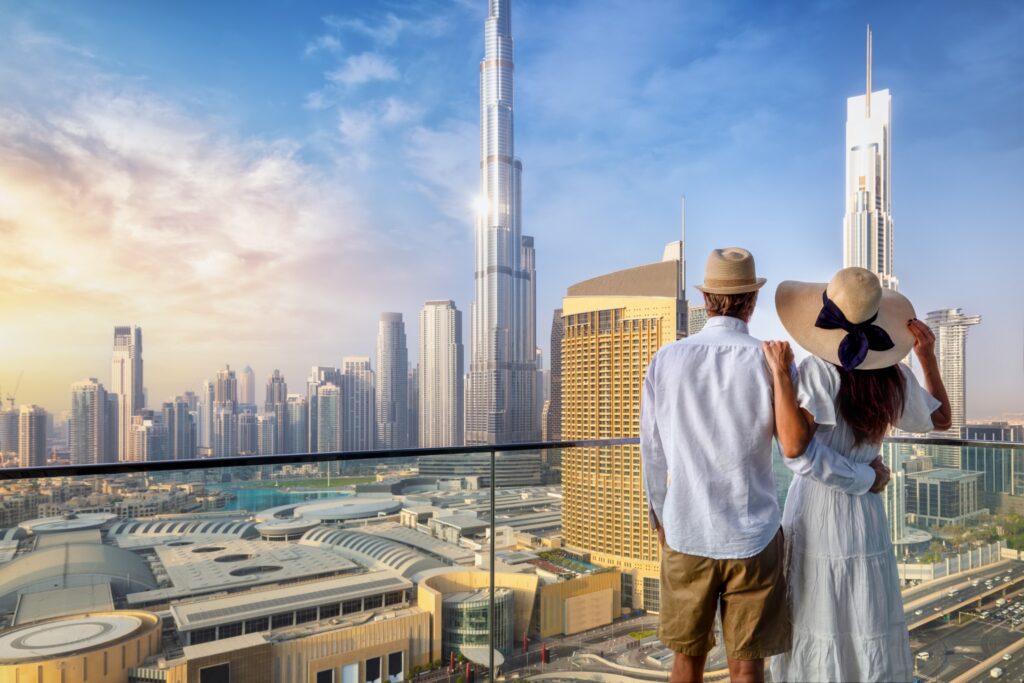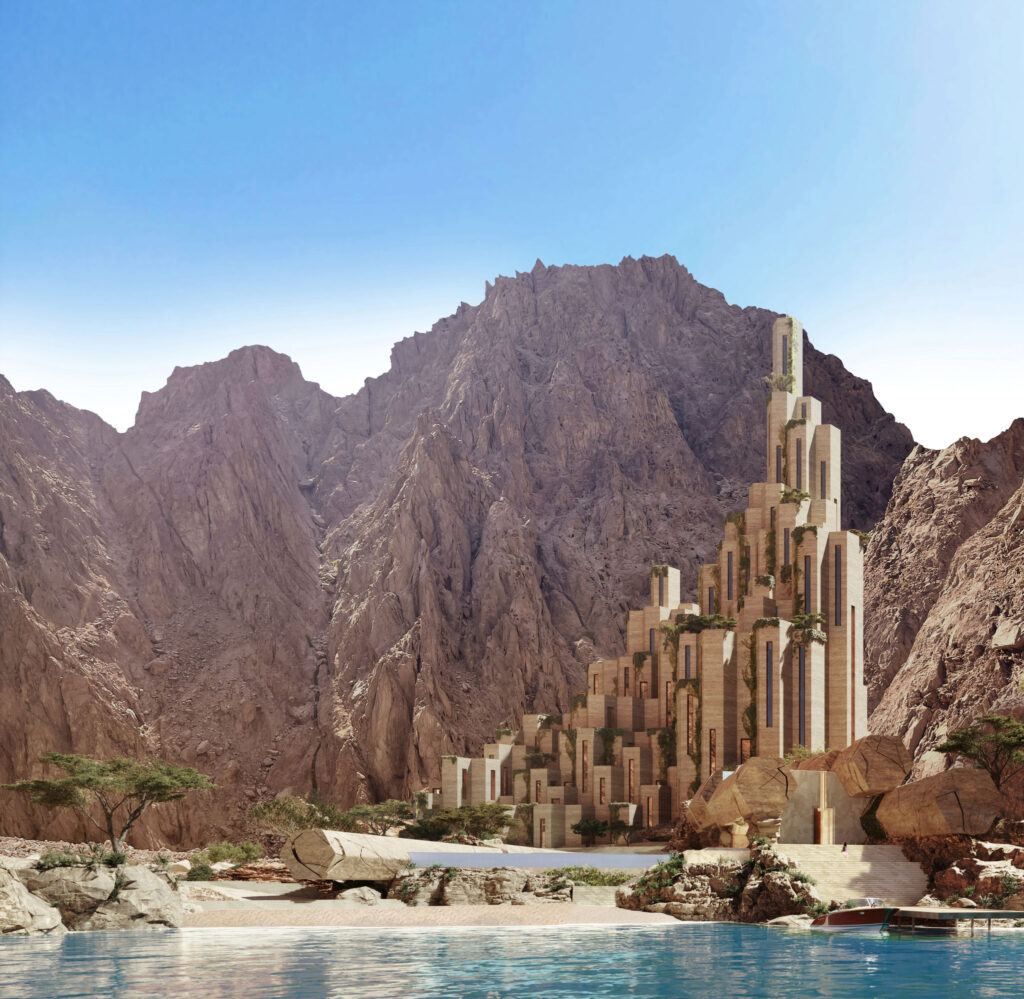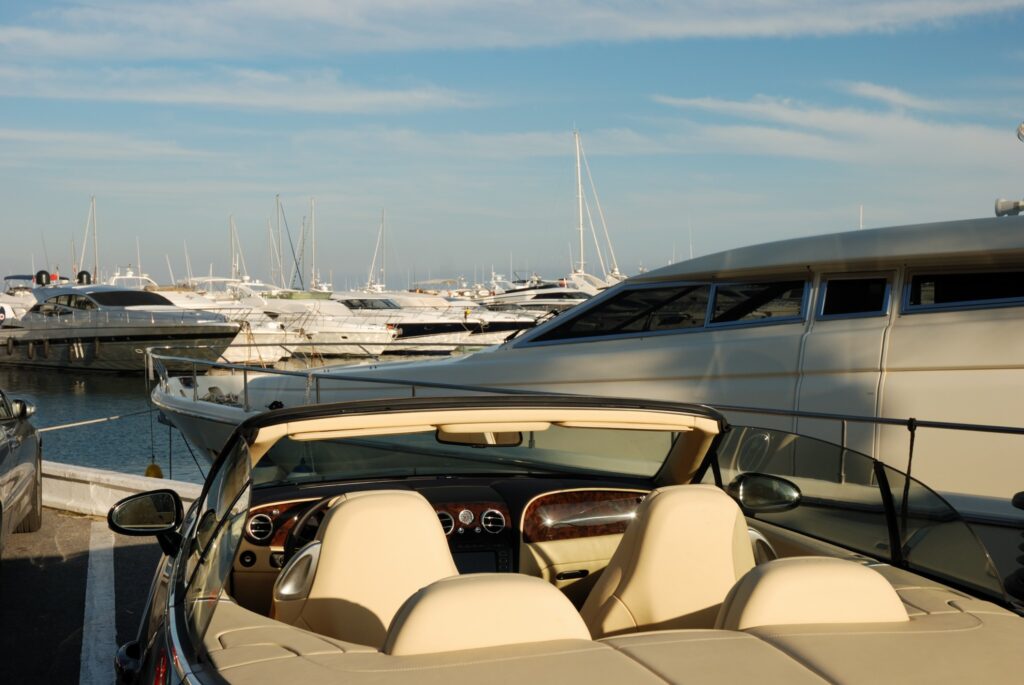
High-net-worth individuals (HNWIs) are people whose net worth amounts to at least $1 million. Ultra-high-net-worth individuals (UHNWIs), on the other hand, are on a higher echelon: They have a net worth of $30 million and more.
Despite economic headwinds, global wealth creation “is turning positive again,” according to a Knight Frank report. At the end of 2023, the number of UHNWIs increased by 4.2 percent compared to the previous year, with nearly 70 new UHNWIs added daily. This brings the global total to over 626,600. The most significant growth occurred in North America (7.2 percent) and the Middle East (6.2 percent).
Meanwhile, the number of HNWIs worldwide is about 21.71 million, according to 2022 data from Statista.
 A luxury private jet overflying cloudy skies at sunset
A luxury private jet overflying cloudy skies at sunset
UAE attracts the wealthy
The Middle East is an emerging haven for the world’s financial elite. The United Arab Emirates (UAE) is particularly appealing.
Henley & Partners — in collaboration with New World Wealth — released the World’s Wealthiest Cities Report 2024. It shows that Dubai, an economic powerhouse in the UAE, is the wealthiest city in the region and the 21st-wealthiest city in the world.
“Turning to the Middle East, Dubai easily takes the crown as the wealthiest city in the region… Currently ranked as the 21st-wealthiest city in the world, the ultra-modern wealth magnate is highly likely to break into the Top 20 in the coming years,” the British consultancy firm said in a press release.
“And although the UAE’s oil-rich capital Abu Dhabi hasn’t yet cracked a spot in the Top 50 ranking, growth rates of over 75 percent make it a likely contender in the future,” it added.
In a more recent report, the country is projected to be the leading “wealth magnet” in the world. In the Henley Private Wealth Migration Report 2024, the UAE is expected to attract a net inflow of 6,700 foreign HNWIs. The US ranks second in the list, with 3,800 millionaires.
Globally, a record-breaking 128,000 millionaires — each with at least $1 million in liquid assets — are expected to relocate in 2024.
“This great millionaire migration is a canary in the coal mine, signaling a profound shift in the global landscape and tectonic plates of wealth and power, with far-reaching implications for the future trajectory of the nations they leave behind or those which they make their new home,” said Dominic Volek, group head of private clients at Henley & Partners, stated.

Dubai as an HNWI magnet
In Dubai, the number of HNWIs increased by 78 percent to 72,500 between 2013 and 2023. Dubai is also home to 212 people with over $100 million and 15 billionaires.
This influx is supported by the UAE’s economic environment and golden visa program. Under this program, investors, entrepreneurs, and skilled professionals can have long-term residence if they reach certain requirements (e.g., investing in real estate worth at least AED 2 million).
But what makes the UAE’s financial capital even more attractive?
One of Dubai’s most appealing aspects is its robust economic framework. The Dubai Economic Agenda (D33), unveiled in January last year, aims to double the city’s economy by 2030.
Under this strategy, Dubai aspires to become the fastest-growing and most attractive global business hub and operations center for multinational corporations (MNCs), small and medium-sized enterprises (SMEs), and local champions. Beyond that, D33 aims to position Dubai as a top 4 global financial hub and the preferred capital market in the Middle East, Africa, and South Asia (MEASA) region.
Dubai’s strategic location also substantially helps. According to a report by OAG Aviation, the Dubai International Airport (DXB) remains the world’s busiest airport as of July 2024 — at 5.1 million seats. In 2023, it received 86.9 million passengers. Meanwhile, the Al Maktoum International Airport is also being transformed into an “airport city.” The $35 billion project will be five times bigger than DXB, spanning 27 square miles. Dubai is also home to Port Jebel Ali, which is the largest container port in the Middle East.
Moreover, the city boasts a thriving real estate sector, which is a major draw for HNWIs, especially those considering relocating.
In 2023, the Dubai Land Department recorded a historic 1.6 million real estate transactions, with a total transaction value exceeding $173 billion. Real estate investments, in particular, grew by 55 percent to about $112 billion. There were 157,798 investments from 113,655 owners, including 71,002 new investors. Non-resident investors made up 42 percent of these new investors.
 .
.
Abu Dhabi: A rising hotspot
The Henley & Partners report also noted that Abu Dhabi is becoming a major millionaire hotspot, with 22,700 HNWIs. The UAE political capital is home to the ruling royal family and a substantial chunk of the country’s oil and gas reserves.
Like Dubai, Abu Dhabi also has a comprehensive economic plan: the Abu Dhabi’s Economic Vision 2030. This strategy aims to increase the city’s GDP by over five times by 2030 — while also bolstering its sustainability efforts.
Crucial to Abu Dhabi’s economic development is the Abu Dhabi Global Market (ADGM), the city’s international financial center. In recent years, it has proven to be an attractive hub for family offices that advise wealthy individuals. As a “Capital of Capital,” Abu Dhabi also takes pride in its favorable business environment. The ADGM, for instance, offers full foreign ownership for registered entities.
In the first quarter of 2024, ADGM saw a record 211 percent increase in assets under management, driven by a surge of global asset managers setting up operations there. The number of operational entities rose by 30 percent year-on-year to 1,950. These include 291 financial services entities. Now, ADGM has 107 fund and asset managers overseeing 137 funds.
In 2023, prominent HNWIs — including cryptocurrency’s richest man and former Binance CEO Zhao Changpeng, India’s Adani family, hedge fund billionaire Ray Dalio, and Russian steel magnate Vladimir Lisin — have ave established special purpose vehicles (SPVs) in ADGM. The UAE’s double tax treaty helps wealthy individuals reduce taxes for companies within SPVs. Nonetheless, this is still dependent on whether the other countries they do business with have agreements with the UAE.
In an interview with Bloomberg, Bhaskar Dasgupta, a corporate adviser who had experience working for the Abu Dhabi free zone, said, “ADGM is a great place to set up SPVs, and it’s increasing sharply. We’re seeing more high-net-worth individuals moving from the BVI (British Virgin Islands), Caymans, Mauritius and Singapore to here.”
Abu Dhabi’s strategic location connecting three continents — allowing it to reach two-thirds of the world’s population within an eight-hour flight — also helps. Another factor that boosts the city’s reputation is its safety. For the eighth consecutive year, the UAE capital remains the world’s safest city, according to online database Number.

Saudi’s appeal
Beyond the UAE, many other Middle East and North Africa (MENA) countries are attracting wealthy individuals. The Henley & Partners report particularly highlighted Jeddah and Riyadh as major wealth magnets in Saudi Arabia. The country, as a whole, is expected to entice 300 millionaires by the end of the year.
In the report, the firm stated, “In our view, these two cities have the potential to mimic Dubai and Abu Dhabi in attracting large numbers of wealthy expats in the future.”
Jeddah, a coastal city on the Red Sea, is home to many of Saudi Arabia’s wealthiest families and serves as the country’s main port. It currently has 7,500 HNWIs. On the other hand, the capital city of Riyadh is a major GDP contributor. It also hosts the Public Investment Fund, Saudi Arabia’s sovereign wealth fund, and the Saudi Stock Market (Tadawul), one of the largest stock markets globally by market cap. About 18,200 HNWIs call the city home.
In a 2022 report by Knight Frank, NEOM is also an enticing spot, especially for HNWIs looking to invest in real estate. About 60 percent of surveyed HNWIs said they are interested in buying a home in this giga project, making it the most desired area among HNWIs in Saudi Arabia. Of this populace, 97 percent remarked that they are likely to make a purchase.
The Red Sea Project comes in second place with 22 percent, followed by AlUla in third with 13 percent.
Saudi Arabia’s economic expansion — covering various strategies to attract investors — is outlined in the Saudi Vision 2030, first unveiled in 2016. And according to experts, Vision 2030 has been successful in putting the country on the radar of global investors.
For Amine Fichtali, head of investment banking at J.P. Morgan Saudi Arabia, described the country as an exciting and compelling investment story. Fichtali noted its long-term socio-economic transformation and the execution of regulatory reforms that enhance the country’s global appeal.
Saudi Arabia offers tax breaks and incentives to businesses relocating to Riyadh, and its tourism efforts continue to invite more foreigners to the country. The country also has a robust National Industrial Development and Logistics Program (NIDLP), which aims to make Saudi Arabia a global industrial and logistics hub.

Türkiye as an investment destination
According to Knight Frank’s aforementioned Wealth Report, Türkiye is also on the global map of investors. Among the 30 countries surveyed, Türkiye had the highest increase in the number of UHNWIs, at 10 percent. In 2022, the country had 1,761 UHNWIs, and this number increased to 1,932 in 2023. Türkiye’s HNWI appeal further bolsters the broader MENA region’s position in the global scene.
One of the major reasons for Türkiye’s attractiveness is the country’s economic resilience. Earlier in July, the International Monetary Fund (IMF) increased its 2024 GDP growth forecast for Türkiye from 3.1 percent to 3.6 percent. The country’s real estate market also offers significant prospects, particularly in cities like Istanbul, Bodrum, and Izmir. These areas boast luxurious developments, historic charm, and competitive prices.
Moreover, Swiss private banks — including UBS, Union Bancaire Privée (UBP), Bank Rothschild, and Julius Baer — are actively entering the Turkish market. This bolsters the country’s reputation, especially among investors and wealthy individuals.
In UBS’ Global Wealth Report 2024, Türkiye also emerged as the country with one of the fastest growth in terms of individual household wealth in local currency terms. It particularly jumped by 157 percent. Since UBS’s report began in 2008, Türkiye has experienced the fastest growth in average wealth per adult in local currency terms, increasing by 1708 percent by 2023.
UBS forecast the country’s millionaire populace to see a 43-percent increase by 2028, hitting 87,000.
In December last year, President Recep Tayyip Erdoğan lauded the country’s financial initiatives, stating that foreign capital continues to flow into Türkiye through the stock market, significantly supporting economic growth.
Speaking at the 150th-anniversary event of Borsa Istanbul, he said that the Türkiye’s exchange entity plays a vital role in financing the country’s economic growth. He remarked, “As a country that has attracted more than $255 billion in international investment in 21 years, we will focus on deepening our capital markets in the coming period.”

Qatar as a financial hub
In the said UBS report, Qatar was also highlighted. The country recorded a 20 percent growth in household wealth in local currency terms. By 2028, Qatar’s millionaires could grow by 14 percent to reach 30,000.
Boasting one of the world’s highest GDP per capita, Qatar is also a haven for HNWIs. Earlier in May, the Qatar Financial Center (QFC) reaffirmed its commitment to attract wealth management companies in an effort to attract more HNWIs.
Speaking at the event “Wealth Management Perspectives: Navigating Challenges & Embracing Solutions,” QFC Authority CEO Yousuf Mohamed al-Jaida said, “A prevailing trend we observe is the increasing mobility of high-net-worth individuals across geographic bases. As an organization committed to establishing Qatar as a premiere commercial and financial hub in alignment with the Qatar National Vision 2030, it is imperative that we capitalize on this phase.”
QFC provides various flexible structures for wealth management, including family offices, holding companies, investment clubs, special purpose companies, foundations, trusts, and limited liability companies. These structures offer benefits like limited liability protection, customized asset management, and efficient risk management. QFC’s business-friendly regulations and competitive tax incentives make it an appealing environment for wealth managers.
Apart from the country’s business landscape, it also offers a dynamic real estate scene.
Knight Frank’s Destination Qatar 2023 Report, 37 percent of Qatar’s HNWIs prefer residential real estate as an investment, while 33 percent mentioned office real estate as their preference.
In the report, James Lewis, managing director at Knight Frank MENA, cited how the country’s hosting of the 2022 FIFA World Cup helped boost Qatar’s appeal.
“Qatar’s recent role as host nation for the 2022 FIFA World Cup has undoubtedly helped to elevate its status as one of the Gulf’s leading commercial nerve centers. The world’s largest footballing event helped to crystalize Qatar’s vision of a modern state, with over $300 billion being spent on transport infrastructure, hotels, new office towers, new mini-cities, an incredible metro system, and brand new world-class international airport to compliment one of the world’s best airlines,” he stated.
Global wealth growth
According to Knight Frank, the number of ultra-wealthy individuals will increase by 28.1 percent globally by 2028. This is driven by lower interest rates and a sharp recovery in equity markets, among other factors.
This anticipated growth in the ultra-wealthy population is part of a broader trend of global wealth recovery.
Global net wealth experienced a significant rebound in 2023, increasing by 4.3 percent after a challenging year in 2022. This is according to the Global Wealth Report 2024 by BCG. This growth was largely due to a recovery in financial markets and an increase in AuM. Financial wealth, a segment of global wealth, rose by nearly 7 percent, following a 4 percent decline in 2022.
BCG’s 24th Annual Global Wealth Report also highlights the potential of generative artificial intelligence (GenAI) to drive operational efficiencies and enhance client experiences. This technology can revolutionize the value chain, providing improved client interaction and personalization at scale.
“Wealth creation resumed in 2023 — but even so, wealth managers cannot afford to stand still. To capitalize on growing global wealth, industry players, among others, will need to set a clear digital transformation strategy and leverage GenAI to manage costs and improve client experience,” Michael Kahlich, a managing director and partner at BCG, stated.

